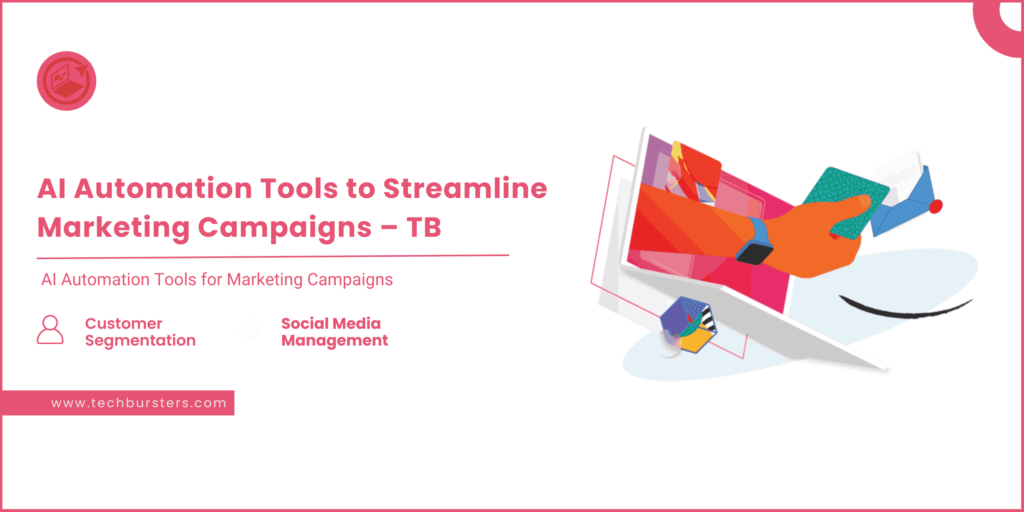
Adaptation to innovation and competency in staying ahead of competitors is the key, particularly in this fast-changing realm of digital marketing. In this case, such traditional marketing methods are rapidly being replaced by AI automation tools. Therefore, businesses can manage their efforts much more efficiently and develop a campaign as more attractive and effective.
What are AI Automation Tools for Marketing Campaigns?
AI automation tools are those types of software applications that rely on artificial intelligence while automating various tasks and processes within the framework of marketing campaigns. AI automation tools like chatbots, predictive analytics, Natural Language Processing (NLP), and machine learning algorithms.
Such tools have applications in most of the marketing platforms where specific marketing tasks such as lead generation, social media marketing, and content management are carried out.
1) AI for Personalization and Customer Segmentation
Personalization is no longer optional -it’s obligatory. Consumers now expect brands to modify their messages and offers according to individual needs. AI automation allows marketers to scale in bringing such personalized experiences through the analysis of customer data to understand their behaviors and preferences.
As a process, AI can help build very targeted and personalized campaigns based on demographics, past behavior, and real-time interaction.
Examples of AI-based personalization tools:
- HubSpot: The product uses AI to create and classify highly detailed customer profiles. By doing so, the business can send more relevant marketing messages across different channels, generating more sales.
- Dynamic Yield: This enables businesses to personalize web, application, and email experiences, all in real-time. Dynamic Yield optimizes all touchpoints with AI-driven content optimization, product recommendation, and customer experience.
- Adobe Experience Cloud: This company uses the power of artificial intelligence to automate the process of segmentation so that marketers can easily target any right piece of content to the right audience at the right time.
Advantages
- Increases customer engagement through customized content
- Improves conversion rates through customized offers
- Keeps customers only when it has a customized experience
2) Email Marketing Automation
Email marketing has always been one of the most effective channels for reaching customers. However, managing a big-scale email campaign is something of a challenge. AI in email marketing automation assists in scheduling email campaigns and optimizing them effectively.
Examples of AI-based email marketing tools:
- Mailchimp: Here, the Mailchimp AI capabilities feature audience behavior analysis to determine the ideal time for delivering emails, personal recommendation generation, and optimizing email subject lines for increased open rates.
- ActiveCampaign: It links the customer journey with predictive analytics and enables marketers to deliver accurate and concise messages, promptly, without any need for manual intervention.
Advantages
- The tool learns repetitive tasks such as lead nurturing and follow-up.
- The open and conversion rate gets higher due to AI-optimized timing and content.
- Reduces human errors in campaign management.
3) AI Tool for Social Media Management
Handling several social media platforms can be quite a chore. Companies want a consistent voice across the board, which may be daunting at times, to uphold with so many social media platforms. These tools automate the analyzing process, engagement, posting process, and communication to customer inquiries.
These AI tools enable marketers to stay active on social media without spending hours upon hours each day updating manually.
Examples of AI-powered social media tools:
- Hootsuite: With AI automation features, marketers can schedule posts on different platforms, monitor performances, and promptly reply to customer engagements.
- Buffer: There is another automation tool, which is Buffer, that allows social media scheduling with the assistance of AI-driven analytics to get their social media strategies to perfection.
- Cortex: Cortex uses AI analysis to social media data, so it can predict which type of content will best perform for any audience, and hence, help marketers optimize how they schedule their posts and campaigns.
Advantages
- Saves time with the automation of posting scheduling and tracking performance.
- Provides knowledge regarding the best content performer.
- Responds to customer inquiries in the least possible time.
Good to Read:- Best Seo Strategies to Rank Website in 2024
4) AI-Based Content Generation Tools
Content is the backbone of most marketing campaigns. However, the time spent on producing quality and highly engaging material is considerably high. AI content generation tools intervened, helping business owners reduce the effort on the same, within minimal time, that would take hours and hours while being rendered by a human writer.
Examples of AI-powered content creation tools:
- Jasper.ai: Jasper uses machine learning in the generation of various forms of content, be it for blog posts, social media updates, or even subject lines for email, or ad copy. This ability to understand the nuances of language allows it to create interesting, almost human-like text.
- Copy.ai: Copy.ai also uses what Jasper boasts of automatic generation of high-converting sales copy and content that could be SEO-optimized by marketers, saving hours from their work.
Advantages
- Reduces time spent on content creation.
- Ensures the content is SEO-friendly.
- Allows for scaled content strategy without an increase in headcount.
- Increases creative output through the immediate availability of many alternatives in content to be shared.
5) AI Chatbots and Customer Support Automation
AI-powered chatbots are transforming the way businesses engage with their customers. These bots can respond to customer queries 24/7, give personalized product recommendations, and lead people step by step through the buying process. According to recent stats, 23% of customer care organizations are currently using AI chatbots to give more prominent support to customers. Automating customer support enables improving response times and increased customer satisfaction as well as reducing operational costs.
Examples of AI-powered chatbot tools:
- Drift: The AI chatbot from Drift helps businesses talk in real time with web visitors through automatic responses of support, answer questions, and lead capture.
- Intercom: This tool automates interactions through different channels, such as social media, email, and chat. Their AI helps them route common issues and escalate more complex matters to human representatives when appropriate.
Advantages
- Reduces stress on on-call support teams.
- Enhances customer satisfaction through the speed with which they get answers.
- Enables businesses to provide round-the-clock support without the pressure of costs.
Good to Read:- How To Choose The Right Software Testing Service For Your Project?
Finishing Lines
The role that AI plays is continuously evolving, and we expect it to do so in the marketing of businesses. This evolves toward a state where all businesses can use data and automation to have an edge.
The adoption of AI automation tools will help streamline the overall marketing efforts of businesses and enhance their reach toward customers. AI is here, and the future of marketing is in.
